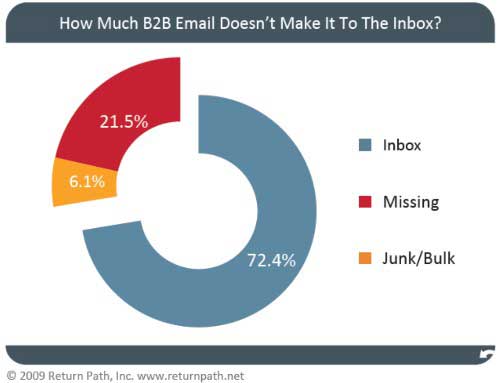As the global recession grinds on, marketers continue to turn to email marketing to drive sales. But those efforts often confront email-deliverability obstacles: In the US and Canada, more than 20% of commercial email doesn't reach subscribers' inboxes, according to a Return Path study.
Commercial, permissioned emails on average reached only 79.3% of inboxes in the US and Canada during the first half of 2009 (January through June), a Return Path Deliverability Benchmark Report found:
- Some 3.3% of commercial, permissioned emails is routed to a "junk" or "bulk" email folders, and 17.4% is not delivered at all--with no hard bounce message or other notification of non-delivery.
- The US deliverability rates of commercial, permissioned emails are slightly better than those for Canada: In the US, the inbox-placement rate is 82%, while Canada's is just 75%.
B2B marketers face an even tougher time reaching business email addresses, which are often protected by additional layers of email monitoring, including systems such as Postini, Symantec, and MessageLab:
- On average, 27.6% of commercial emails sent to business addresses don't reach the inbox, Return Path found.
- That is, just 72.4% of commercial email is delivered to business inboxes, with emails more likely to be delivered to a junk folder vs. consumer email (6.1% vs. 3.3%):

"Many marketers aren't even aware that one-fifth of their emails are never reaching the inbox," said George Bilbrey, president and cofounder of Return Path.
"In many cases, marketers [think they] are seeing...a 95% to 98% delivery rate. Unfortunately, many ESPs and marketers have developed the belief that whatever emails aren't bouncing have successfully reached the inbox. That's just not true, as...hard bounces aren't the only emails that aren't reaching your subscribers."
Different ISPs, Different Rules, Different Delivery Rates
Successful deliverability to consumers' inboxes varies by ISP:
- Google's Gmail is the most stringent US-based ISP for permissioned marketers to reach, according to the report: 23% of emails that marketers sent to Gmail addresses did not reach the inbox.
- The top 5 US ISPs ranked in order of difficulty for marketers' emails to reach users' inboxes are Gmail, Hotmail, MSN, Comcast, and AOL.
Marketers face an even tougher time reaching Canadian inboxes:
- Primus.ca, which uses Postini as part of its email filtering system, failed to deliver 53% of emails that marketers sent to Primus.ca users.
- The top five Canadian ISPs ranked in order of difficulty for marketers' emails to reach consumers' inboxes are Primus.ca, Shaw, Aliant, SaskTel, and Inter.net.
Failure to Reach Inbox = Less Revenue
The Direct Marketing Association projects that email marketing will generate an ROI of $43.52 in 2009, at least twice that of search and other marketing channels. Email's strong performance, however, often covers up email-deliverability issues.
Good email performance could be even better if more of their emails were reaching consumers inboxes, Return Path said: "For example, if a company with a file size of 100,000 email records earns an average of $1 per email sent, they are missing out on an additional $20,000 from every email campaign with an inbox placement rate of 80%."
Bilbrey concludes that "as ISPs continue their daily battle to keep consumers' inboxes protected from the onslaught of spam, legitimate commercial emails that consumer want to receive aren't being delivered. It's imperative that marketers dig into their deliverability stats to truly see how many of their emails are successfully reaching the inbox."
About the data: To compile the Return Path Deliverability Benchmark Report, Return Path studied data from more than 500,000 email campaigns conducted from January to June 2009 that used the Mailbox Monitor seed list system. Return Path recorded whether the emails were missing, received in the inbox, or filtered to the junk/spam folders (for those ISPs that use such a folder). Return Path studied data from 45 ISPs in the United States and Canada for its report.



